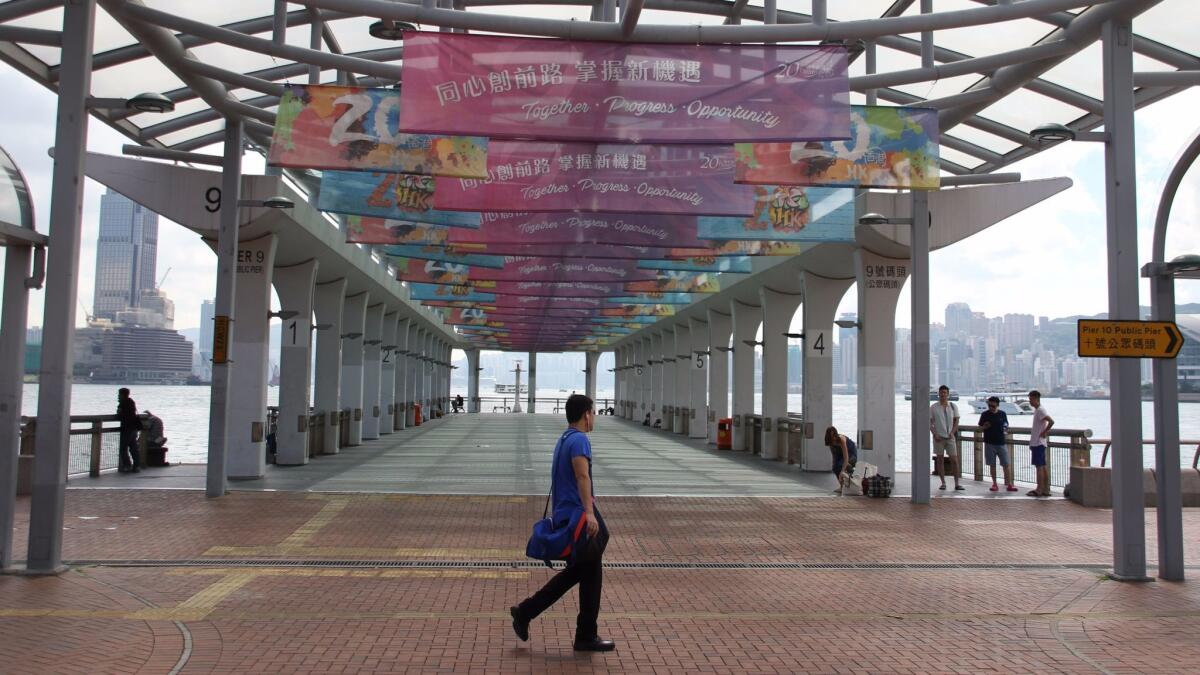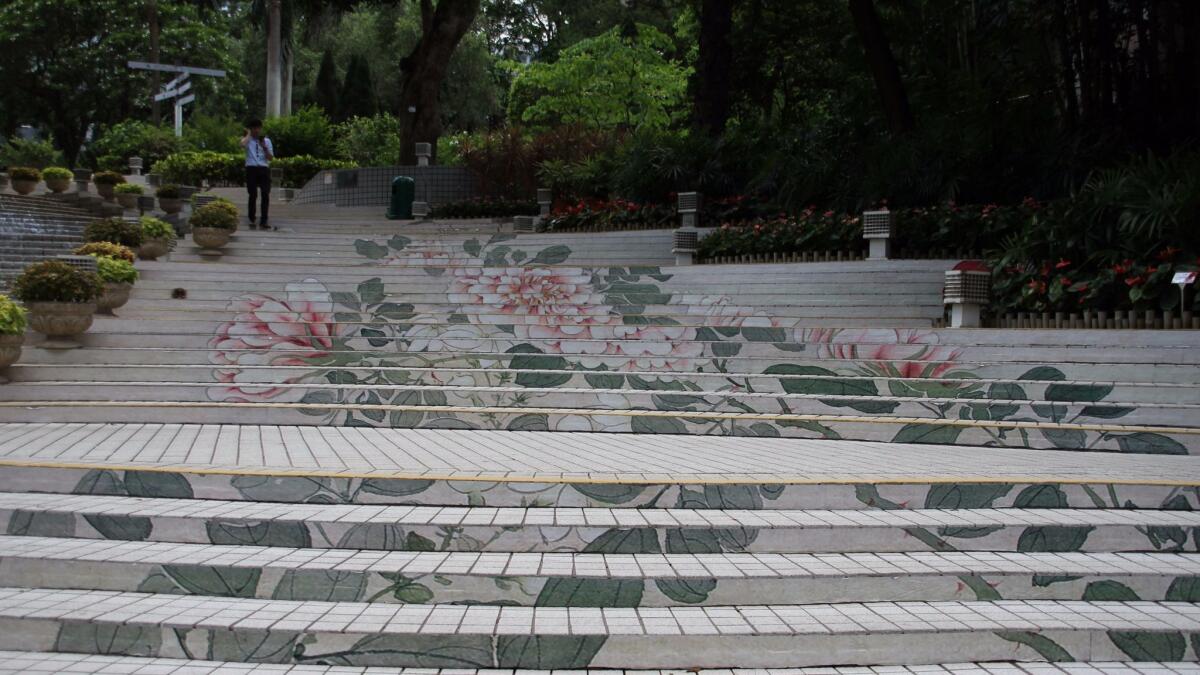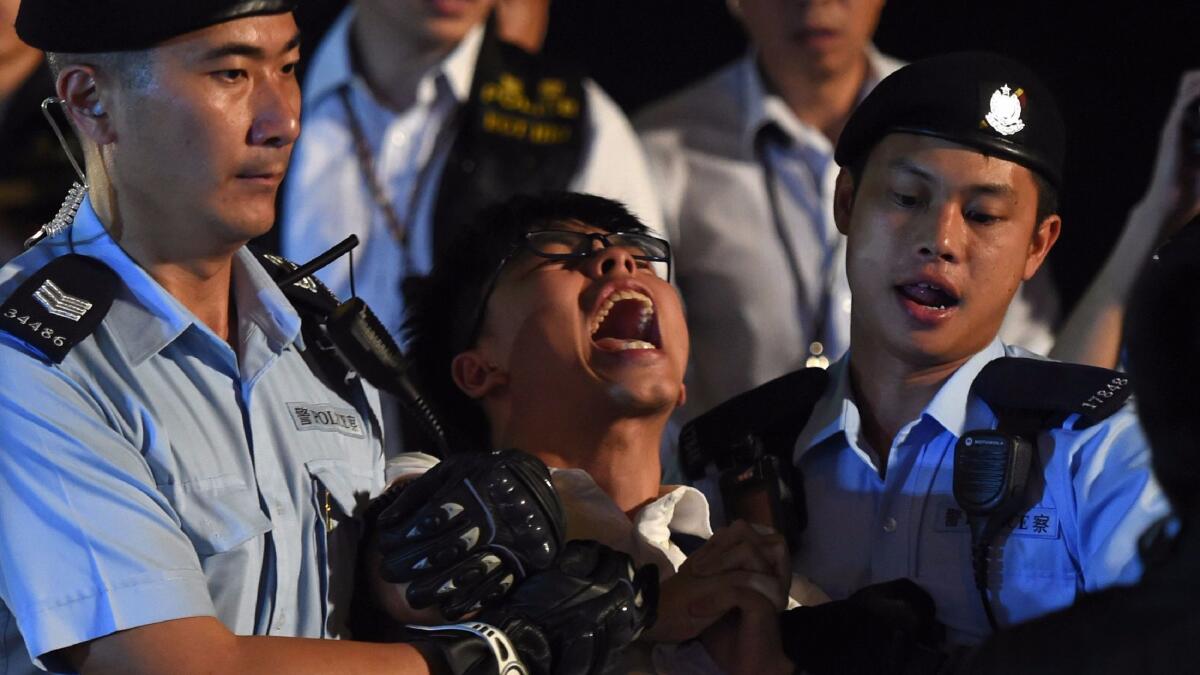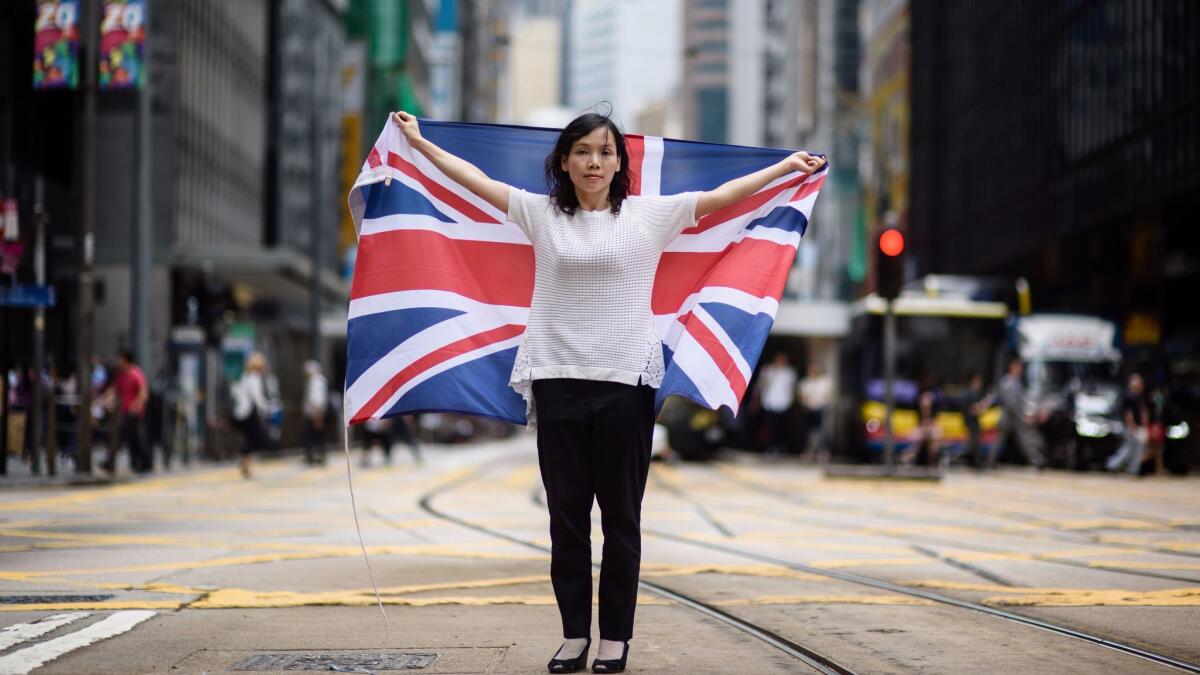On eve of Hong Kong’s 20th anniversary under Chinese rule, many residents wonder what’s to celebrate

- Share via
Reporting from Hong Kong — Reminders are everywhere, even underfoot. Stairs at Hong Kong parks, glued with Chinese floral prints, help mark an anniversary many refuse to celebrate.
Hong Kong will commemorate 20 years under Chinese rule Saturday, honoring the rainy night Britain returned the territory and ended a century and a half of colonization.
Local officials are spending $82 million on the festivities. China’s Xi Jinping will make his first trip to Hong Kong as president, a new leader will begin her term, and sparkling fireworks over Victoria Harbor will illuminate Asia’s financial hub.

But the sheen of celebration belies a divided society and a disenchanted populace. A small group of largely pro-Beijing elites chose the new chief executive, despite public opposition. Many citizens can’t afford to live in its towers. Thousands plan to protest Xi’s visit.
Chinese leaders agreed to give Hong Kong a “high degree of autonomy” when they retook the territory. Now, more than ever, residents fear China is reneging on the deal.
People thought “as long as we’re not breaking any Hong Kong laws, we’re safe in our own beds,” said Anson Chan, the territory’s former No. 2 official under the British and Hong Kong governments. “Now, no one thinks they’re safe in their own bed.”
The first signs of conflict started Wednesday night, when police arrested 26 pro-democracy protesters for being a public nuisance — including legislator Nathan Law and Joshua Wong, a 20-year-old activist who has become the territory’s symbol of defiance.

They encircled the Golden Bauhinia statue, a blooming flower monument that China gave to Hong Kong to cheer the transfer of sovereignty. Xi will attend a flag-raising ceremony there this week.
Before the handover, Chinese and British officials negotiated a “one country, two systems” framework that lets the semiautonomous territory keep its independent courts, uncensored media and free speech for 50 more years — rights not enjoyed on the mainland.
Hong Kong is much better off than some predicted when it moved from Western governance to communist rule. Its economic output last year was nearly 60% higher than two decades ago. The tterritory tolerates political debate and regularly ranks as the world’s freest economy.
But an increasing number of its 7.3 million people sense those freedoms eroding.
“I fear for the worst,” said Adrian Chiu, a 25-year-old research assistant, “that ‘one country, two systems’ will soon only exist in name.”
The U.K.’s seizure of the territory in 1841 came as a surprise, even to the British. Leaders sent an admiral to seek compensation for confiscated opium; he annexed Hong Kong Island. The British imposed their legal and economic system — and, in many ways, their culture — on the colony.

China finally regained its land, although political differences have meant a perennially rocky relationship. Concerns heightened in 2012 when Xi and Hong Kong Chief Executive Leung Chun-ying, backed by Beijing supporters, came to power.
It “formed the perfect storm,” said Jason Y. Ng, a Hong Kong attorney and author who has chronicled the territory’s recent history.
That year, thousands protested Beijing efforts to introduce nationalist curriculum in public schools. They won.
Even more shut down streets in 2014 to demand the right to elect their own leader. That 79-day protest, known as the Umbrella Movement, proved less successful. But it did spark a nascent pro-independence movement and ruffle a central government intent on unification.
In 2015, five booksellers who sold scintillating stories about the country’s top officials disappeared — and then surfaced across the border. One confirmed that Chinese secret police had abducted him.
In January, mainland agents grabbed a sleeping Chinese billionaire from the Four Seasons Hotel and carted him out in a wheelchair.
China has also stepped in to issue a rare interpretation of Hong Kong law, in effect barring two pro-independence legislators from retaking their oaths. (They referred to China as “Shina,” a demeaning word once used by the Japanese.)
Zhang Dejiang, a top Chinese official, recently called the relationship one of “delegation of power, not power-sharing.”
The world’s second-largest economy no longer needs Hong Kong’s business acumen or its money. China’s economy was just five times larger than the territory’s before the handover. Now it’s more than 35 times bigger.
“On the express train of a robust economic growth, the country has reserved a seat for Hong Kong,” said Zhang Xiaoming, director of the mainland’s liaison office in Hong Kong, according to the state-run China Daily.
Chinese officials are completing a high-speed rail line and a 31-mile bridge to connect Hong Kong with Guangdong province, physically binding the two regions.
Few know how to respond. Only a small number of Hong Kong residents dream of outright independence, but a more radical contingent chafes at pro-democracy advocates who want to work within the system. Establishment groups worry a generation of young activists is unnecessarily stoking Beijing’s ire.
“We cannot undermine what Hong Kong has achieved and was able to maintain in the past 20 years,” said Priscilla Leung, a legislator and vice chairwoman of the pro-Beijing Business and Professionals Alliance for Hong Kong. “China still gives us a lot of room to remain ourselves.”
Anxieties about China’s encroachment are further fueled by accusations about the dilution of Hong Kong’s culture, a so-called mainlandization.
Some residents blame mainland Chinese buyers for boosting property prices. The wealth gap is its highest in four decades; young people struggle to advance. Only 3% of youth identify as Chinese, according to a recent Hong Kong University survey, a record low.
Mercedeses drive by sweat-soaked deliverymen hauling pungent dried fish.
“We Hong Kongers have to fight for everything against each other as well as those mainland migrants,” said Chan Mo-shan, 47, who sells stationery supplies. “That’s why people are getting more and more frustrated.”
This sets the stage for a tense party. The city will deploy at least 9,000 officers during Xi’s three-day visit, and police have been instructed to remove signs that might embarrass leaders.
“President Xi hopes to prove it’s a time for celebration, but Hong Kong will show it’s a time for demonstration,” Wong said before his arrest.
More than 100,000 protesters could retrace the Umbrella Movement path on Saturday, he told The Times. “It’s necessary for people around the world to keep their eyes on Hong Kong.”
Xi will attend events in the same convention center where officials swapped flags 20 years ago — the mood uncertain, as now, about the territory’s future.
Meyers is a special correspondent. Special correspondent Gaochao Zhang contributed to this report.
Twitter: @jessicameyers
ALSO
Carrie Lam, in a nod to Beijing, wins Hong Kong leadership race
Hong Kong relives its failed push for greater democracy as leadership election nears
One day after pro-Beijing chief executive is elected, Hong Kong arrests 9 protest leaders
More to Read
Sign up for Essential California
The most important California stories and recommendations in your inbox every morning.
You may occasionally receive promotional content from the Los Angeles Times.










